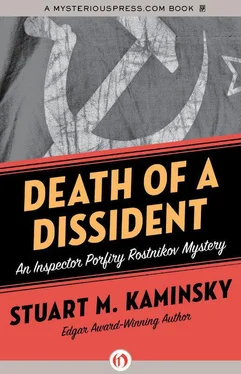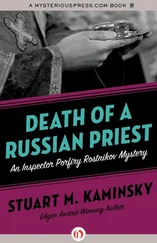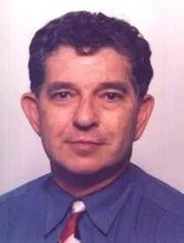Stuart Kaminsky - Death of a Dissident
Здесь есть возможность читать онлайн «Stuart Kaminsky - Death of a Dissident» весь текст электронной книги совершенно бесплатно (целиком полную версию без сокращений). В некоторых случаях можно слушать аудио, скачать через торрент в формате fb2 и присутствует краткое содержание. Год выпуска: 2012, ISBN: 2012, Жанр: Полицейский детектив, на английском языке. Описание произведения, (предисловие) а так же отзывы посетителей доступны на портале библиотеки ЛибКат.
- Название:Death of a Dissident
- Автор:
- Жанр:
- Год:2012
- ISBN:9781453266298
- Рейтинг книги:4 / 5. Голосов: 1
-
Избранное:Добавить в избранное
- Отзывы:
-
Ваша оценка:
- 80
- 1
- 2
- 3
- 4
- 5
Death of a Dissident: краткое содержание, описание и аннотация
Предлагаем к чтению аннотацию, описание, краткое содержание или предисловие (зависит от того, что написал сам автор книги «Death of a Dissident»). Если вы не нашли необходимую информацию о книге — напишите в комментариях, мы постараемся отыскать её.
Death of a Dissident — читать онлайн бесплатно полную книгу (весь текст) целиком
Ниже представлен текст книги, разбитый по страницам. Система сохранения места последней прочитанной страницы, позволяет с удобством читать онлайн бесплатно книгу «Death of a Dissident», без необходимости каждый раз заново искать на чём Вы остановились. Поставьте закладку, и сможете в любой момент перейти на страницу, на которой закончили чтение.
Интервал:
Закладка:
The most likely person to contact was obvious and that, indeed, was the person with whom Rostnikov had made the appointment. Although he had been in this area of dachas in which they found themselves, Rostnikov was not really familiar with them. It was an alien world normally denied him and other policemen. When crime occurred by or to the members of this cultural elite, it was invariably handled by the K.G.B. or the militia.
The driver found the house with little difficulty and pulled into the small driveway in front. It was a two-story home, wood and brick, freshly painted from the summer. Rostnikov got out and the driver began to follow.
“You remain here,” said Rostnikov, motioning the man back without looking at him.
“As you wish, Comrade Inspector,” was the reply, and Rostnikov heard the car door close behind him. He walked to the front door, anxious, apprehensive and a bit angry, angry that he should feel this way. This was the home of a rich man, not one who was rewarded for his achievements in the arts or sciences or government or even athletics, but a man who everyone knew had grown rich by black market connections, by alterations of government manufacturing contracts, by bribes-yes even massive bribes to the police. It was known and he was tolerated. No, he was not just tolerated, he was supported, one of the hidden capitalists who helped the economy and were purposefully overlooked.
Rostnikov knocked. The door was solid and painted white. Inside he could hear footsteps on a hard floor and the door opened. A woman, a very beautiful woman somewhere in her thirties, opened the door and smiled at him with teeth Rostnikov thought impossible to maintain in Moscow. Her eyes were so blue that they seemed to be painted and her straight yellow hair was swept back like a Frenchwoman’s.
“You are Inspector Rossof?” she said.
“Rostnikov,” he corrected.
“Yes,” she said, stepping back to let him in. “Sergei was on his way out of the door when you called this morning. I just caught him.”
They stood in a small hallway with dark wooden floors.
“I did not mean to…” Rostnikov began.
“That’s all right,” she stopped him with a smile. “Come, he is in the parlor.”
Rostnikov followed her a few steps. She stopped and turned around.
“It is Ilyusha, isn’t it?” she said softly, her smile suddenly vanishing.
“Your…” Rostnikov began not sure of the relationship of this woman and the man he was pursuing.
“My stepson,” she said coming to his aid. “I don’t really know him. I actually only met him once and we didn’t get on.”
“I see,” said Rostnikov sagely, though he didn’t see why she was telling him this.
Her smile returned. “I don’t even know what he has been doing, what his interests are,” she said, and Rostnikov understood. This woman wanted to make it clear that she was no part of Malenko’s political position or anything else he might be involved in.
“I see,” he said, and this time he did.
“I was a clerk in my husband’s factory when Ilyusha-”
Her statement was interrupted by the opening of the door before which she stood. She stepped back as if the sound had brought with it a terrible blast of heat.
“Elizabeth,” said the man who now stood before them, “I must get to town for that meeting with the under-minister. I’d appreciate seeing the inspector immediately.”
“I’m sorry,” Elizabeth Malenko said, unable to keep from looking around the hallway at all she might lose by offending the important man.
“It’s all right,” the man said. “Perhaps the inspector would like some tea or coffee.”
“Coffee would be fine,” said Rostnikov, wondering if a cup of coffee constituted the first step in a bribe.
The woman disappeared through another door, and the man backed up to let Rostnikov enter the room.
In the doorway, Sergei Malenko had simply seemed a middle-size, middle-shaped man, but inside the surprisingly large room, he reminded Rostnikov of a small actor playing a businessman. Malenko was about sixty, with bushy grey-black hair and a determined, furrowed brow. It was a hard face, one that had suffered and worked, not the soft image of the black market capitalist that had flourished in Russian movies and posters during the two decades after the war. This did not surprise Rostnikov. What little he had been able to gather on Malenko told him that the man had begun humbly enough-a farmer’s son and a farmer himself, who had gone to work in a tubing factory when he was thirty-five and made himself an expert on tubular metal construction. He used this expertise to move up in the factory at the same time as he moved up in party circles by applying himself diligently to political organization. Sergei Malenko was a clever man and not a weak one.
The room was very much the man, with well-polished, heavy wooden furniture, dark brown walls and rug, a fireplace already crackling with burning logs in spite of the fact that the house obviously had another heat source. On the walls were painted portraits of Lenin and figures unknown to Rostnikov.
“I’m sorry to be a bit abrupt, Inspector,” Malenko said, sitting in a dark couch and indicating to Rostnikov that he should sit across from him in a matching couch, “but I do have to get to my work.”
“I understand fully,” said Rostnikov with an apologetic smile as he seated himself, letting his leg remain out where it would not stiffen.
“This is about Ilyusha,” said the man, looking directly at Rostnikov, his hands folded before him. Malenko’s suit was similar to Rostnikov’s, but there were subtle differences. Malenko’s was much newer, and he wore a light green sweater of some particularly soft material.
“It is about your son,” Rostnikov confirmed.
“I imagine he is-” and it was Malenko’s turn to be interrupted by his wife, who pushed open the door and moved forward quickly with a tray containing two steaming cups of coffee.
“You want sugar and milk?” Malenko asked, taking some himself.
Rostnikov declined. He assumed the coffee would be good and he had good coffee so infrequently that he wanted it to be very hot and its taste very distinct.
“You have some questions about Ilyusha?” Malenko asked after his wife had withdrawn from the room, closing the door behind her.
The coffee was good and very hot and very strong. It burned the roof of Rostnikov’s mouth, and he wished he had asked for some milk.
“My first question is perhaps a bit tactless,” he said. “If so, please forgive me.” He put up his hands and shrugged in apology. “I’m a policeman and spend much of my time asking crude questions to enemies of the state and not to respected men of production. It strikes me as curious that a policeman comes to your house, that you know it concerns your son, and that you are not upon me with curiosity demanding to know if he is all right, what he has done. Instead you calmly drink your coffee and worry about getting to work.”
“The question is tactless,” agreed Malenko, “but reasonable. I have had little contact with my son for many years, perhaps four or five. We were never close. I think he took up with those dissenters, those social disrupters in reaction to me. And I suppose you are here to tell me that he has gotten into some trouble because of these stupid activities of his.”
“In a sense,” said Rostnikov. “Then, I take it, if your son were in trouble, it is not likely he would come to you for help.”
Sergei Malenko began to laugh. He laughed so hard that the cup in his hand began to shake, and he just reached the dark mahogany table just in time to set it down. His hair tumbled over, and he began to choke on his laughter.
“You’ll have to pardon me,” he said trying to pull himself out of his reaction, “but the very idea of Ilya coming to me for anything is laughable don’t you see?”
Читать дальшеИнтервал:
Закладка:
Похожие книги на «Death of a Dissident»
Представляем Вашему вниманию похожие книги на «Death of a Dissident» списком для выбора. Мы отобрали схожую по названию и смыслу литературу в надежде предоставить читателям больше вариантов отыскать новые, интересные, ещё непрочитанные произведения.
Обсуждение, отзывы о книге «Death of a Dissident» и просто собственные мнения читателей. Оставьте ваши комментарии, напишите, что Вы думаете о произведении, его смысле или главных героях. Укажите что конкретно понравилось, а что нет, и почему Вы так считаете.












